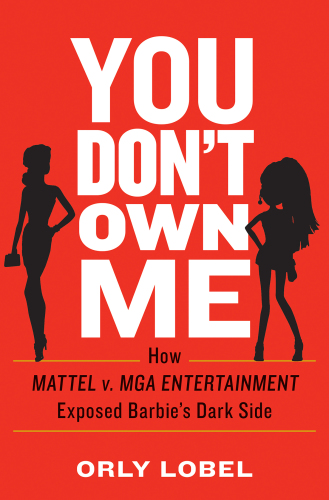
You Don't Own Me
The Court Battles That Exposed Barbie's Dark Side
- اطلاعات
- نقد و بررسی
- دیدگاه کاربران
نقد و بررسی

July 3, 2017
The toy industry can be a cutthroat business, as Lobel (Talent Wants to Be Free) conclusively shows in this impressive account of the 10-year court battle waged between Mattel (maker of Barbie) and MGA Entertainment. The dispute began when designer Carter Bryant conceived of the sassy Bratz toy line, which became “the first doll to present a true market challenge to Barbie since her 1959 debut.” The issue: Bryant pitched the concept to MGA while still employed by Mattel, although he insisted the inspiration came to him while on leave from the latter. After Bratz became a runaway success, Mattel sued MGA for half a billion dollars. Lobel delves into the history of both companies and the backstories of various players. She also raises questions about intellectual-property litigation’s increasingly aggressive bent, which she argues poses the danger of stifling creativity and competition. A professor of law at the University of San Diego, Lobel spent years sifting through hundreds of documents and speaking with dozens of individuals related to the case. The end result is a thoroughly researched book that explains the legalese of patent, property, and copyright law in layman’s terms while providing an entertaining narrative.

October 15, 2017
Exploring the little-known battle for the Barbie doll empire. Lobel (Law/Univ. of San Diego; Talent Wants to Be Free: Why We Should Learn to Love Leaks, Raids, and Free Riding, 2013) bases much of her expose on the arduous, decadelong copyright infringement litigation in which toy giant Mattel became embroiled in 2000. In 1998, creative artist Carter Bryant, who, after years of employment with Mattel, a company he believed to be "political, risk averse, and stuck in the past," took time off hoping to reignite his inspiration. After seven months in his rural Missouri hometown, the idea for four sassy, edgy, urban dolls was born and then shelved in favor of the steady income Mattel provided. Bryant's motivation returned, and using discarded doll parts and clothing scraps, he created rough doll mock-ups and pitched them to Mattel rival MGA Corporation and its competitive CEO and founder Isaac Larian, who immediately greenlighted the project. The massive success of the brazen Bratz line was enough to eventually dethrone the milquetoast Barbie doll. In her crisp narrative, the author pauses to ponder Mattel's notorious litigiousness and Barbie's iconic history, which is illuminating and contains some eyebrow-raising factoids--e.g., 1965's Slumber Party Barbie came equipped with a diet book (first rule: "Don't eat!") and immovable scale set at 110 pounds. The epic trial between these two toy titans spanned a decade and became a dizzying, ego-driven melodrama. Lobel's research is representative of how cutthroat the toy industry can be, a fact that may surprise readers unfamiliar with Mattel's long struggle to recoup Barbie's image ("ice queen doll") as it became replaced by customer fascination with the "modern, voluptuous, multiethnic" Bratz dolls. The author, whose mother is a renowned psychology professor, recognizes the "toy world's grip on society," and she bolsters her investigation with interviews and testimonials from attorneys, jurors, esteemed Judge Alex Kozinski, executives at both Mattel and MGA, and a barrage of financial reports and court documents. An aggressively researched toy story on the "doll-eat-doll world of litigation over inspiration."
COPYRIGHT(2017) Kirkus Reviews, ALL RIGHTS RESERVED.




دیدگاه کاربران